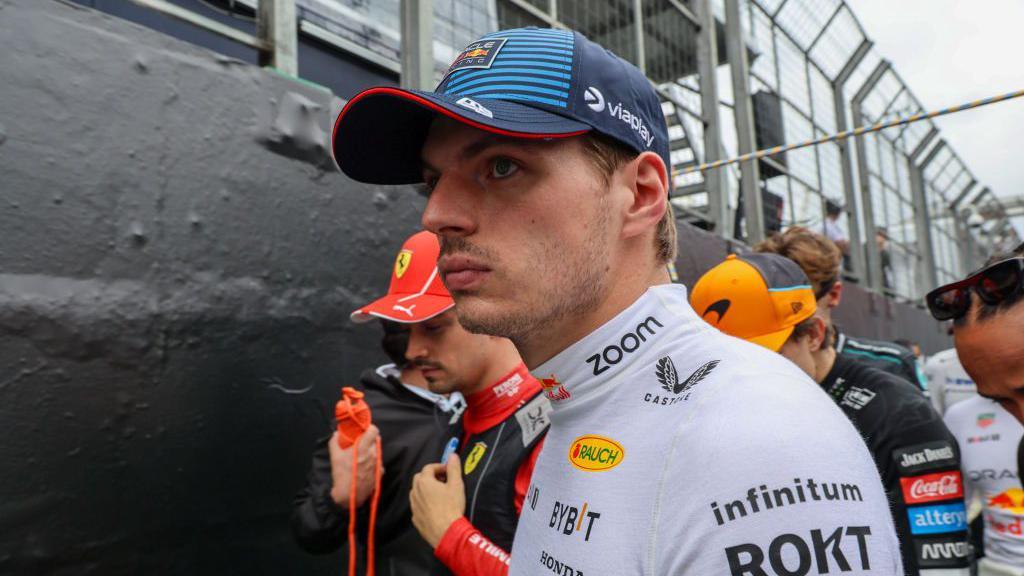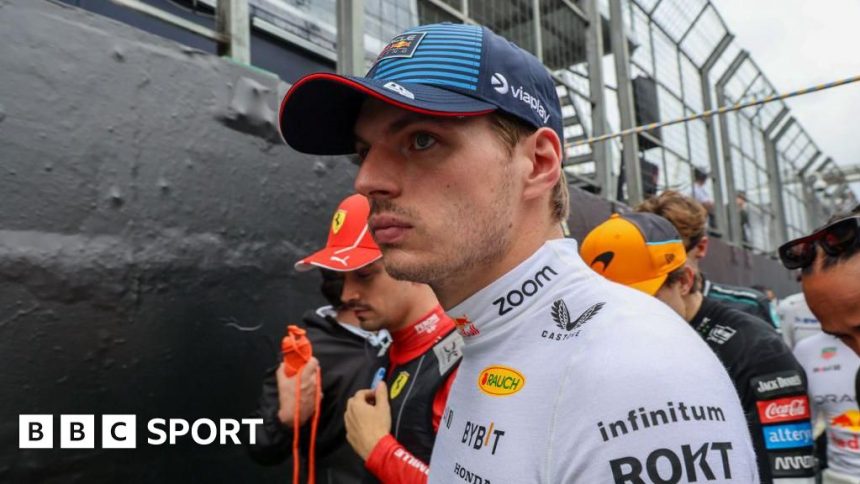F1 drivers ask FIA to treat them like adults

Max Verstappen used a swear word to describe his car in a news conference in Singapore
-
Published
Formula 1 drivers have urged the sport’s governing body to treat them like adults after Max Verstappen and Charles Leclerc were punished for swearing.
The Grand Prix Drivers’ Association has also criticised FIA president Mohammed Ben Sulayem for his “tone and language” when addressing the topic.
An open letter from the Grand Prix Drivers’ Association (GPDA) said: “There is a difference between swearing intended to insult others and more casual swearing, such as you might use to describe bad weather, or indeed an inanimate object such as an F1 car, or a driving situation.
“We urge the FIA president to consider his own tone and language when talking to our member drivers, or indeed about them, whether in a public forum or otherwise.
“Further, our members are adults. They do not need to be given instructions by the media about matters as trivial as the wearing of jewellery or underpants.”
The FIA has been approached for comment.
The letter has been in the offing since Ben Sulayem used an interview with Autosport before the Singapore Grand Prix in September to express his distaste for the broadcast of swearing during grands prix.
In Singapore, Red Bull driver Verstappen was ordered by FIA stewards to “accomplish some work of public interest” after using a swear word to describe his car in a news conference.
The drivers were dismayed by Ben Sulayem’s comments – because any swear words used over team radio are bleeped out before being broadcast, and because they feel that allowing the public to hear the transmissions gives an added dimension to the sport by revealing the characters of the drivers in extreme situations.
Lewis Hamilton accused Ben Sulayem of using “stereotypical” language with a “racial element” in the interview.
Ben Sulayem said F1 had to “differentiate between our sport – motorsport – and rap music”.
Ferrari’s Leclerc was fined at last weekend’s Sao Paulo Grand Prix for using a swear word in the post-race news conference at the previous event in Mexico to describe how he felt when he nearly crashed.
The reference in the GPDA letter to “jewellery or underpants” is to an earlier controversy of Ben Sulayem’s period as president, when he enforced rules on wearing the correct underwear and forbidding the drivers from wearing jewellery.
The letter also expressed the drivers’ unhappiness at fines being used as punishment by the FIA, and asked for transparency as to how the funds are used.
Signed by “the directors and chairman of the GPDA on behalf of the grand prix drivers”, it says: “The GPDA has, on countless occasions, expressed its view that driver monetary fines are not appropriate for out sport.
“For the past three years, we have called upon the FIA president to share the details and strategy regarding how the FIA’s financial fines are allocated and where the funds are spent.
“We have also relayed our concerns about the negative image financial fines bring to the sport.
“We once again request the FIA president provides financial transparency and direct, open dialogue with us.
“All stakeholders (FIA, F1, the teams and the GPDA) should jointly determine how and whether the money is spent for the benefit of the sport.”
Former F1 driver Alex Wurz is the GPDA chairman, and its directors are Mercedes’ George Russell, ex-driver Sebastian Vettel and Anastasia Fowle.
The letter emphasises the drivers’ desire to “collaborate in a constructive way with all the stakeholders, including the FIA president in order to promote our great sport of the benefit of everyone who works in it, pays for it, watches it and indeed loves it”.
In that context, the fact the drivers have gone as far as to publish a letter criticising two key aspects of the FIA’s policing of the sport will be interpreted as evidence of their frustration with Ben Sulayem’s stance on the issues involved.
It is also a reflection of their feeling that they have not been heard or respected by the FIA on the matters in question.
The drivers’ unhappiness can be gauged by the fact that this is their first collective public statement since 2017, when they asked for a reform of the decision-making process in F1 to keep the sport healthy.




